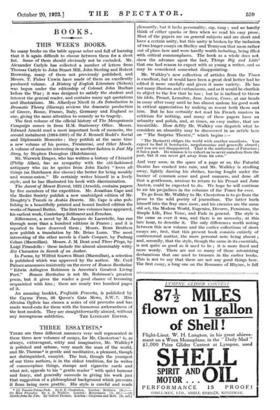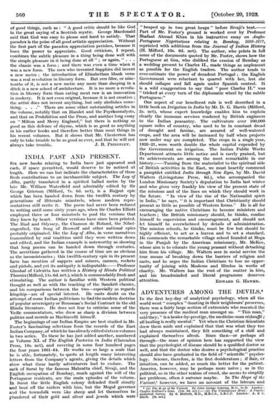THREE ESSAYISTS.*
THERE are three different manners very well represented in these three new volumes of essays, for Mr. Chesterton' is, as always, extravagant, witty and imaginative, Mr. Walkleys is polished and urbane, very much the man of the world, and Mr. Thomas3 is gentle and meditative, a pleasant, though not distinguished, essayist. The last, though the youngest of our three authors, is in the oldest tradition, for he writes of commonplace things, stamps and cigarette cards and what not, appeals to his " gentle reader " with quiet humour and fancy, and generally succeeds in giving his work just that suggestion of a philosophical background which prevents it from being mere prattle. His style is careful and reads • (1) Fancies Versus Pads. By G. IC. Chesterton. London : Methuen. [es.]— (2) More Prejudice. By A. B. Walkley. London : Heinemann. [7s. 8d.]—(8) Sparks from the Eire. By Gilbert Thomas. London: Chapman and HalL Les. net.I pleasantly, but it lacks personality, sap, tang ; and we haidly think of either sparks or fires when we read his easy prose. Most of the papers are on general subjects and are short and have a certain unity, but this unity is broken by the inclusion of two longer essays on Shelley and Tennyson that seem rather out of place here and were hardly worth including, being filled with critical commonplaces. The book as a whole does not show the advance upon the last, Things Big and Little' that one had reason to expect with so young a writer, and so may be considered somewhat disappointing.
Mr. Walkley's new collection of articles from the Times is excellent, but it would have been a great deal better had he edited it more carefully and given it more variety. He has not many illusions and enthusiasms, and so it would be churlish
to object to the few that he has ; but he is inclined to throw his idols, Proust, Lemaitre, Jane Austen, Croce, at our heads
in essay after essay until he has almost undone his good work in critical appreciation by making us resent both them and
him. But he has certainly not read his French masters in criticism for nothing, and many of these papers have an urbanity and polish, and, at times, an easy malice, that arc irresistible. How deftly Mr. Walkley can dispatch what he considers an absurdity may be discovered in an article here on " The Surprise Theatre," which begins :-
" The Marinetti obliges the world with another manifesto. You expect to find it bombastic, megalomaniac and generally absurd ; and you are not disappointed. That is the misfortune of Futurism ; it has a past. Its mission is to exhort us to sever ourselves from the past, but it can never get away from its own."
And very soon, in the space of a page or so, the Futurist theatre has crashed into ruin, and Mr. Walkley is strolling away, lightly dusting his clothes, having fought under the banner of common sense and good manners, and done all that a gentleman, anxious to return to his Proust and Jane
Austen, could be expected to do. We hope he will continue to air his prejudices in the columns of the Times for ever.
To go from Mr. Walkley to Mr. Chesterton is to go from the prose to the wild poetry of journalism. The latter hurls himself into the fray once more, and his enemies are the same old set, the Modern World, Eugenics, Divorce, Feminism, the Simple Life, Free Verse, and Fads in general. The style is the same as ever it was, and there is no necessity, at this late hour, to describe it. The only differences worth noting between this new volume and the earlier collections of short essays are, first, that this present book consists entirely of controversial matter, the more personal note being absent ; and, secondly, that the style, though the same in its essentials, is not quite so good as it used to be ; it is more fixed and more wordy. There are not so many of those astonishing declarations that one used to treasure in the earlier books.
This is not to say that there are not any good things here. The first essay, a long one on the Romance of Rhyme, is full
of good things, such as : " A good critic should be like God in the great saying of a Scottish mystic. George Macdonald said that God was easy to please and hard to satisfy. That paradox is the poise of all good artistic appreciation. Without the first part of the paradox appreciation perishes, because it loses the power to appreciate. Good criticism, I repeat, combines the subtle pleasure in a thing being done well with the simple pleasure in it being done at all " ; or again, " . . . the classic was a form ; and there was even a time when it was a new form. The men who invented Sapphics did invent a new metre ; the introduction of Elizabethan blank verse was a real revolution in literary form. But vers libre, or nine- tenths of it, is not a new metre any more than sleeping in a ditch is a new school of architecture. It is no more a revolu- tion in literary form than eating meat raw is an innovation in cookery. It is not even original, because it is not creative ; the artist does not invent anything, but only abolishes some- thing. . . ." There are some other outstanding articles in the volume, notably that on Hamlet and the Psychoanalysts, and that on Prohibition and the Press, and another long essay on " Milton and Merry England," but there is nothing so good as this defence of rhyme, which is as good as anything in his earlier books and therefore better than most things in his recent volumes. But it shows that Mr. Chesterton has only to take trouble to be as good as ever, and that he will not











































 Previous page
Previous page